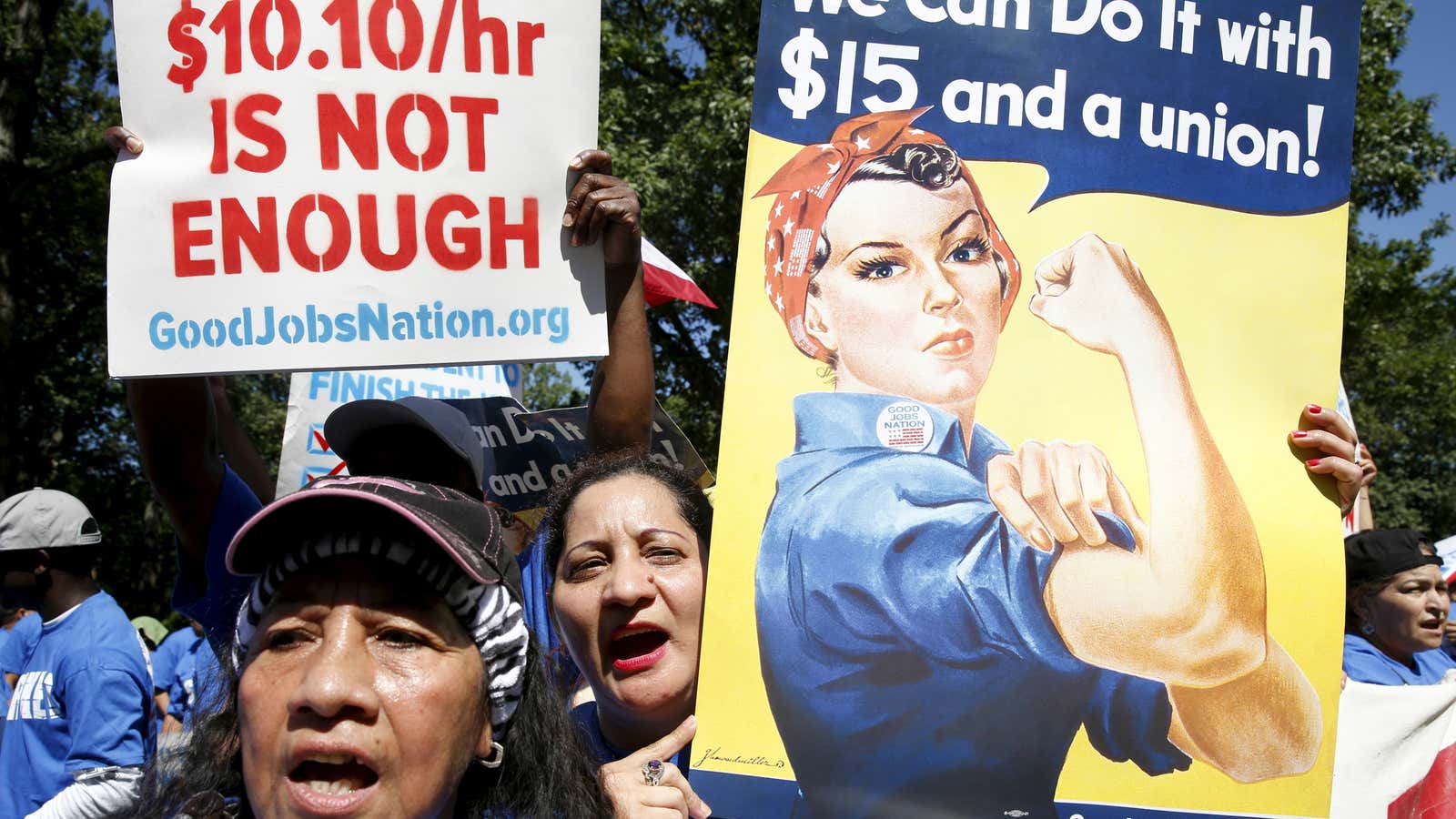The future for millions of Americans working low-wage jobs still looks to be $7.25 an hour.
Democrats were pushing to include an increase in the federal minimum wage as part of a proposed $1.9 trillion stimulus package, but its fate has likely been determined: On Feb. 25, the US Senate’s parliamentarian said that hiking the minimum wage to $15, as the Democrats sought to do, could not be included in the bill, arguing it falls outside the scope of what the Democrats can do in the budget reconciliation process.
Invoking reconciliation is a tactic that protects the package from a filibuster, bypassing the need for 60 Senate votes and allowing it to pass with only a simple majority in the closely divided chamber. But that comes with stringent rules requiring that components of the bill be tied directly to the budget.
The House is voting today on the stimulus package, which will bring Americans closer to receiving $1,400 checks as the legislation moves onto the Senate.
Bernie Sanders and Josh Hawley suggest similar alternatives
Getting a federal $15 minimum wage was seen as a test of whether US president Joe Biden would be able to work across the aisles. Biden, a Senate veteran, had predicted that a minimum wage hike would not survive the procedural process.
The provision will now have to be considered as a standalone bill or as part of another piece of legislation. Vermont senator Bernie Sanders said it would not stand a chance in that case. “As of now, there’s not one Republican who will support a $15 an hour minimum,” he said in an interview with MSNBC. “The only way that we are going to raise the minimum wage is through reconciliation or ending the filibuster.”
Sanders said he is now looking to propose an addition to the stimulus package that would take tax deductions away from companies that fail to pay their workers at least a $15 hourly wage. The tactic could get bipartisan support—Missouri Republican Josh Hawley announced a similar plan to Sanders’ that would essentially require companies with more than $1 billion in revenue to pay a $15 minimum wage.
Other Republicans have proposed minimum wage increases short of $15. Senators Mitt Romney and Tom Cotton are proposing a raise to $10 an hour, but would require businesses to use the federal government’s E-verify program to ensure that they are not hiring undocumented workers.
At least two Senate Democrats, Joe Manchin of West Virginia and Kyrsten Sinema of Arizona, have opposed a $15 minimum wage. Manchin had proposed an increase to $11 instead.
Any increase would mark the first raise since 2009.
Five US states do not have a minimum wage above the federal level
Earlier this month, the Congressional Budget Office estimated that raising the minimum wage to $15 an hour would boost the pay for as many as 27 million Americans and lift nearly 1 million out of poverty. It also would result in the loss of as many as 1.4 million jobs, the agency predicted.
The federal minimum wage is now just one-third of the median US wage. Many states have set minimums above the federal level. But five states—Alabama, Louisiana, Mississippi, South Carolina, and Tennessee—do not have a state minimum wage requirement.
Despite the wrangling in Congress, raising the minimum wage to $15 an hour is overwhelmingly popular with Americans of various political persuasions. In November, Florida voters passed a $15 minimum wage in the same election that saw them vote for the re-election of Donald Trump to the White House.
Numerous attempts to raise the federal minimum wage have died on the Congressional floor. Former US president Barack Obama unsuccessfully called on Congress to raise the minimum wage in 2014. In 2019, the House voted to raise the minimum wage to $15 an hour by 2025, but the Senate killed the proposal.
After the latest maneuvering failed to pass muster with the Senate parliamentarian, some progressive Congressional members, like Minnesota representative Ilhan Omar, openly shared their frustration.
